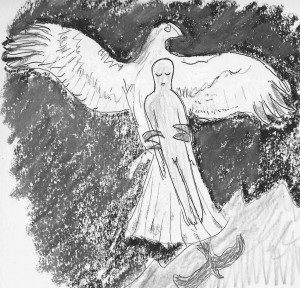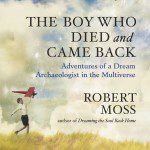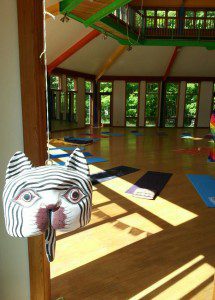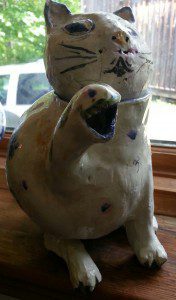 I died for the first time in my present body when I was three years old. My mother’s aunt, the opera singer, saw my death in the tea leaves a few months before it happened. She would not talk about that until much later, because although she was a gifted psychic, she missed something. I died and came back.
I died for the first time in my present body when I was three years old. My mother’s aunt, the opera singer, saw my death in the tea leaves a few months before it happened. She would not talk about that until much later, because although she was a gifted psychic, she missed something. I died and came back.
I died again when I was nine. This time I slipped through the window of a Melbourne hospital where my body was lying in an operating theater. I thought I was going to have some fun at a theme park along the beach, but ended up spending a whole lifetime in another world. It was very hard to have to come back to the body of a young boy, carrying all those memories.
During my boyhood, it was almost impossible to talk about these experiences. It was a conservative era in Australia, and I was in a military family. The first person who was able to confirm and validate my experiences of leaving my body dead in a hospital room while I entered other worlds was an Aboriginal boy from a traditional dreaming culture. “Oh yeah,” he said to me matter-of-factly, “we do that. When we get real sick, we go and live with the spirits. When we get well, we come back. Not always as the same person.”
We did not have terms like “near-death experience” (NDE) in Australia in that era, more than twenty years before Raymond Moody M.D. expanded our general understanding of how widespread that phenomenon is in his bestseller Life After Life. I am glad to have that term, and often use it as shorthand to describe what happened to me as a boy and often made me feel like a stranger in a strange land. I have read and heard hundreds of accounts of near-death experiences since I read Moody, and feel great sympathy for those who have been through them. But NDE is not my preferred term for my boyhood experiences, and still less for what happened to me in midlife, in a profound and protracted crisis of spiritual emergence that led me to transform my life. I like the phrase a doctor used when I lost vital signs, aged three, after succumbing to pneumonia in a bitter Tasmanian winter. When I returned to that child’s body, against all expectations, he told my parents, “Your boy died and came back.”
I think of myself that way, as a boy who died and came back. There are terms for someone like this in some cultures. In Tibet, the term is delog (pronounced day-loak) and it refers to someone who leaves the body seemingly dead, travels in other worlds, and comes back with first-hand knowledge of the geography and current conditions in those realms. I have had such knowledge since I was very young, but lacking elders and mentors and a context of understanding in my own society, I was required to be discreet about what I knew.
Nonetheless, I was able to use the gifts that come with what Western psychiatry may call dissociation but ancient and indigenous cultures respect as an engagement with the Otherworld and possibly a shamanic initiation. I could step in and out of time, visit the future and receive visitors from other times and other dimensions. I did ridiculously well in my final school examinations – my photo was on the front pages of the newspapers – in part because I was able to preview the questions, in lucid dreams, before they were given to me in the exam rooms. My intimate connection, in nonordinary reality, with figures from the ancient world helped to propel me into my first job, as a lecturer in ancient history at the Australian National University, at the ripe age of 22. My ability to see what was going on behind the curtain walls of consensual reality served me well when I left academia and became a journalist, covering and often predicting major events in 35 countries from my base as a staff writer and editor for The Economist in London.
I used my dreams, as well as my adventures as a foreign correspondent, as materials for a series of thrillers published in the 1980s. Four of them made the New York Times bestseller list, and this gave me the freedom to say goodbye to employment and live as a full-time writer. I assigned some of my dreams to my fictional characters. When I got on a plane, I sometimes found half a dozen people reading my current novel. Not only able to live as a writer but able to live very well, I may have seemed to others to be living a dream. But this dream quickly palled. Something in my soul was clawing me to a greater purpose.
I decided to get off the commercial fast track and put down roots in my adopted country by moving to a farm in upstate New York. Here, on the edge of traditional Mohawk land, the spirits came after me in a different guise and the shadow of other lives fell across me in ways I could not ignore. I came to accept (not without resistance, confusion and backsliding) that I was required to do nothing less than transform my life. Eventually I embarked on a path for which there is no career track in Western culture: the path of a dream teacher and dream archaeologist. Once again, I died and came back.
 Adapted from The Boy Who Died and Came Back: Adventures of a Dream Archaeologist in the Multiverse by Robert Moss. Published by New World Library.
Adapted from The Boy Who Died and Came Back: Adventures of a Dream Archaeologist in the Multiverse by Robert Moss. Published by New World Library.
Drawing (c) Robert Moss

